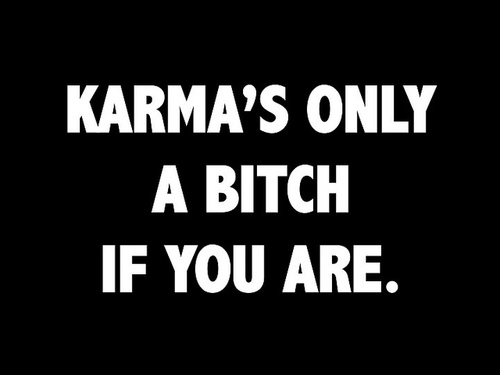My slow fall from being The Woman I Always Wanted to Be to Depressed Internet Zombie all started when I followed (hopefully for the last time!) my abhorrent romantic habit that Meg Jay advocates against — just choosing whoever is choosing you.
In all other arenas of life, for better or worse, I’d always been a steamroller on a path of my carefully calculated preference. In matters of the heart, however, my lack of interest in romance and my unhealthy Catholic-girl-people-pleasing made for an unfortunate combination.
Suffice to say I have been blindsided by or talked into every single relationship I’ve ever been in. Each time I’ve been asked, “Why won’t you just give me a chance,” I’ve been caught without a good, logical answer.
“Uh”¦ because my intuition says no,” didn’t seem an acceptable or reasonable excuse.
I’d acquiesce.

Huh? You, like… want to… date me? Uh… ummm… photo: pixabay
“I suppose this person does deserve a chance,” I’d admit mentally. “I mean they are [insert positive characteristics]. And it’s probably not that big of deal that they [insert red flag behaviors]. What could it hurt to spend a little more time with them?”
Ultimately, bereft of my own solid, clear, articulable opinion, I just did what it seemed like I was supposed to do. (Which we’ve already covered is always a fan-freaking-tastic idea that leads only to wonderful things.)
When I think about it that way, it’s a bit shocking that I made it through fourteen years of relationships — six long term connections (1, 1, 2, 1, 1, and 6 years) and three summer flings – with relatively little baggage.
But I know the secret.
Full Confession
Acquiescing to romantic scenarios doesn’t mean I switched out of steamroller mode. While I can be an incredibly thoughtful and deeply caring partner, I can also be very exacting. A.k.a: demanding, challenging, rigorous, thorough, tough, onerous”¦ or to borrow one from my kindergarten report card: bossy.
It took six and a half years of being reminded by the kindest man I know that, “No one’s way of doing things is better, just different”¦” for me to really embrace the idea that steamroller-mode might not be a “mostly good” thing.
Once I’d fully digested the importance and benefits of accepting others for who they are instead of trying to help (read: change) them1see #2 here, where this annoying trait of my personality type is explained more kindly, and once I’d realized the value in not filling every space with my ideas and opinions”¦ I met the bossiest man I know.
Karma, as they say, is a bitch.

photo: chocolatecoveredlies
And it was this entanglement — boss meets recovering boss – that would set me on a long (and I suppose fully deserved) spiral into internet-zombie-hood.
It’s particularly funny that my super-kind former boyfriend was fond of saying, “You know, you could NEVER date someone who was like you.” Because he was wrong. In fact, he taught me how to do exactly that via his shining example. He showed me just how to tolerate a highly capable, intelligent person who is constantly asserting their opinion about every single facet of life — from what to do on Saturday to which pan should be used to cook dinner, and from where to go on vacation to how each item should be packed in the car.
As I got dose after dose of my own medicine, I experienced first-hand the energy drain that comes with constantly being sucked into someone else’s priorities, plans, goals, and opinions. It’s overwhelming and exhausting to be endlessly confronted with a bossy person’s intentions for both themselves and you, presented under the whisper-thin veil of collaboration. (Karma, karma, karma!)

Hi Honey! Huh? You want to talk about what time we should get up… in five days? Uh… sure. Seven sounds okay…” – photo: gratisography
To regularly stop one’s own thoughts and activities to discuss another’s thoughts and activities slowly deflates one’s sense of identity. The demands are so incessant and often so mundane, that it becomes more efficient just to give in almost every time.
“Sure, I’ll go that café you discovered the other day. Sure we can go to your work/family thing after. Sure, we can work on the home project you’ve been wanting to do.”
After all, most of the tasks and agendas and ideas proposed by this adept and clever person are objectively good things. But meeting this brilliant person’s constant demands leaves one surrounded by accomplished goals”¦ in which one has little-to-no stake. The trophy shelf is full of gleaming, gorgeous, golden wonder! And you helped win those awards! But your name isn’t on a single one.
Missing Something? Maybe It’s Your Autonomy.
In hindsight I can tell you that having one’s identity co-opted by a domineering partner (under the guise of standard relationship compromise) leads to lost autonomy.
Autonomy is “the capacity of a rational individual to make an informed, un-coerced decision.”2Source
As someone who has been both bossy and bossed, I can assure you that bossy people don’t feel like they are coercing anyone. When you’re used to regularly having the best idea in the group, it doesn’t feel like coercion to talk your fellow students into a concept that will earn everyone an A instead of a B or your co-workers into an idea that will save $50,000 dollars.

photo: berngabrillo
Bossy people are almost always smart people. And speaking from experience, they are often frustrated by the failure of those around them to see the “obvious,” best solutions. They have a lifetime of practice in relieving others of their burden of ignorance. Bossy people genuinely believe they are doing you a super-kind favor when they reveal a better way of doing something.
Bossy people highly value the “best” idea. Since this so often happens to be their idea, making “informed, un-coerced decisions” (i.e. full-autonomy) is a natural state of being for a bossy person. It’s so natural, that they take for granted the inherent value of getting to execute one’s original decision”¦ without being pressured to defend it or change one’s mind.

Bossy people don’t know what it feels like not to regularly stand at the top of the podium. Their most common experience is getting what they want and doing what they want. – photo: pixabay
In the workplace, in the classroom, and among friends, regularly coercing others to make “better” decisions has a mild effect. The bossy person’s fans call them demanding and tough, while detractors call them”¦ demanding and tough, all of which brings a smile to the bossy person’s face.
At work, at school, and at the bar, no one under the influence of the bossy person loses so much autonomy that it starts to affect their sense of identity. However, the level of exposure made possible by a live-in romantic relationship? That’s trouble.
Why?
A sense of identity, which bossy people inadvertently rob from their nearest and dearest, is the birthplace of motivation.
Making an un-coerced decision and achieving the associated results gives one a sense of accomplishment and self-knowing. With achievement comes the confidence and inspiration to take another step, which leads to more accomplishment, identity, confidence, and inspiration.
Despite their well-meaning intentions, bossy people short-circuit this feedback loop. They are constantly coercing others to do “better” things, robbing these lesser-folks of the chance to earn a sense of accomplishment from doing “good enough” things.
The Boss Gets Bossed
Being a recovering bossypants probably made my entanglement with the bossiest man I know worse. Our relationship functioned only because we thought so similarly about how most things should be done. When we differed, I brought out my battle regalia. But I was out of practice and no match for this man’s righteous stamina. Each time my energy supply hit zero well before his did. Then I’d insist we obtain alcohol immediately so that I wouldn’t burst into flames of furious despair.
That was in the beginning.
Eventually, the constant battle fatigued my inner compass. I spiraled into un-recognized, unacknowledged depression within five months. I ascribed responsibility for my lackluster moods to everything but my relationship. It was my job. It was my introversion and lack of alone time. Later, it was the stress of upcoming unknowns. It was a need for recovery from a grueling work schedule. It was the stress of traveling. Even later, it was the stress of selling a house. It was the stress of moving.
By the time we were approaching the two year mark, I was a shell of my former self. And I was still looking outside my relationship for the cause of my empty, hollow, directionless-ness.

“Ugh… why am I so unmotivated? I can’t believe it’s taken me over a year and dozens of different life scenarios to recover from that job. Or maybe it was the too-fast travel. Ugh… when am I ever going to feel like doing stuff again? ” – photo: simon_sees
I’d wake up every morning and basically just wait for it to be time to go to bed. I’d spend the day going through the motions and trying to muster the energy to use my free time to do more than aimlessly scroll Facebook. I’d wonder what it was going to take to recover my old self, how long before I’d return to my glory days. I’d search for and try natural anti-depressants like exercise, daily exposure to salt water, putting gratitude on paper, and eating cashews.
My armor against the internet-addiction-monster had melted away. I easily lost hours to email, Facebook, and clickbait that got me nowhere. I knew about the algorithms that fine-tune user experience to maximize dopamine addiction. And I could see they were working on me. I didn’t care. I woke up numb and scrolled my way into more pronounced numbness. I still didn’t care.
I had no energy to make proactive choices and decisions, so I defaulted to auto-pilot. I was so exhausted fighting for every single inch of my autonomy that energy I formally used to set goals and clarify priorities didn’t exist. I became a lemming floating in my partner’s river of life, accepting how his plans and priorities shaped the bulk of my days.
Spell-Break
Finally, one day, despite my partner’s insistence that “Now isn’t a good time,” I seized an opportunity to escape to my own, private space.
It was there that I:
- was suddenly able to do more than mindlessly scroll Facebook.
- looked back through my daily journal and discovered I’d only said something positive about my relationship on seven of the last hundred days — 7%.
- realized my well-meaning partner was never going to stop trying to control every variable of both our lives.
- mustered the clarity and then the courage to break my own heart along with his.
I cried for five days straight and then intermittently for months”¦ once at the most inopportune time.
Little did I know, extinguishing the autonomy-sucking force in my life was just the beginning. 3For the record, the telling of this story is not a vengeance bid. Don’t worry. The other person, who really just serves as a backdrop for my revelations, never read this website and never will. If it’s not 250 words or less on 9GAG, it won’t get his attention. Even if it went “viral” and was read by millions of people, he would not be among those masses, nor would anyone to whom he is close. And also, this is an essay intended to explore the role of autonomy in motivation. It’s a macro telling of the overall autonomy balance that led to my experiential conclusions, and leaves out micro details that would belong in a gross who-did-what essay… like how a recovering boss still did plenty of her own bossing, especially in the form of relentlessly maintaining exacting standards. But I digress. It seemed important to write this, because I think experiencing both sides of the coin — bossy and bossed – is a very rare occurrence. I hope I can take those lessons from both sides and perhaps have something useful to share with both parties. When I first had these realizations about the role autonomy played in my situation, I shared my revelations with my former-super-nice-partner who I’d bossed for six years. For the entire conversation, he pointed at his head, nodding, as if to say, “Yes – you are describing my experience of you right now. Yup – me again. Yes – it was exactly like that.” If you are a person who regularly gets bossed and you find yourself chronically lacking energy and motivation — especially if you have what most would call a good life — perhaps this perspective will help you figure out why you aren’t happy despite having “everything.” Maybe you have everything except a sense of identity and autonomy. If you are a demanding and tough individual, maybe consider that getting your way — just because it’s the best way — isn’t necessarily doing everyone the favor you think it is. Maybe it’s the reason that person you love so much can’t just pull themselves up by their bootstraps”¦ because every day your influence adds bits of lead to their shoes.
♣
Next: Why Bouncing Back is a Myth
References
| ↑1 | see #2 here, where this annoying trait of my personality type is explained more kindly |
|---|---|
| ↑2 | Source |
| ↑3 | For the record, the telling of this story is not a vengeance bid. Don’t worry. The other person, who really just serves as a backdrop for my revelations, never read this website and never will. If it’s not 250 words or less on 9GAG, it won’t get his attention. Even if it went “viral” and was read by millions of people, he would not be among those masses, nor would anyone to whom he is close. And also, this is an essay intended to explore the role of autonomy in motivation. It’s a macro telling of the overall autonomy balance that led to my experiential conclusions, and leaves out micro details that would belong in a gross who-did-what essay… like how a recovering boss still did plenty of her own bossing, especially in the form of relentlessly maintaining exacting standards. But I digress. It seemed important to write this, because I think experiencing both sides of the coin — bossy and bossed – is a very rare occurrence. I hope I can take those lessons from both sides and perhaps have something useful to share with both parties. When I first had these realizations about the role autonomy played in my situation, I shared my revelations with my former-super-nice-partner who I’d bossed for six years. For the entire conversation, he pointed at his head, nodding, as if to say, “Yes – you are describing my experience of you right now. Yup – me again. Yes – it was exactly like that.” If you are a person who regularly gets bossed and you find yourself chronically lacking energy and motivation — especially if you have what most would call a good life — perhaps this perspective will help you figure out why you aren’t happy despite having “everything.” Maybe you have everything except a sense of identity and autonomy. If you are a demanding and tough individual, maybe consider that getting your way — just because it’s the best way — isn’t necessarily doing everyone the favor you think it is. Maybe it’s the reason that person you love so much can’t just pull themselves up by their bootstraps”¦ because every day your influence adds bits of lead to their shoes. |




I can’t even express how much this helped me. I’ve been struggling with difficult emotions since my mother’s death 2 years ago. She was a bossy type. I loved her more than anyone in the world, so it has upset me that since her death, old feelings of resentment over this or that conflict keep resurfacing in my mind. Your ability to share the perspective of both the bossy and the bossed has brought me clarity and much greater understanding. I feel closer to her and more at peace. Thank you for sharing your wisdom. It is precious.
(Well-written and entertaining, too. I smiled in recognition at your reference to knowing “how each item should be packed in the car.â€) 🙂
Hi Cynthia – I’m thrilled that you found the article useful. I’m sorry about the loss of such a deeply loved mother. All the best to you in healing!